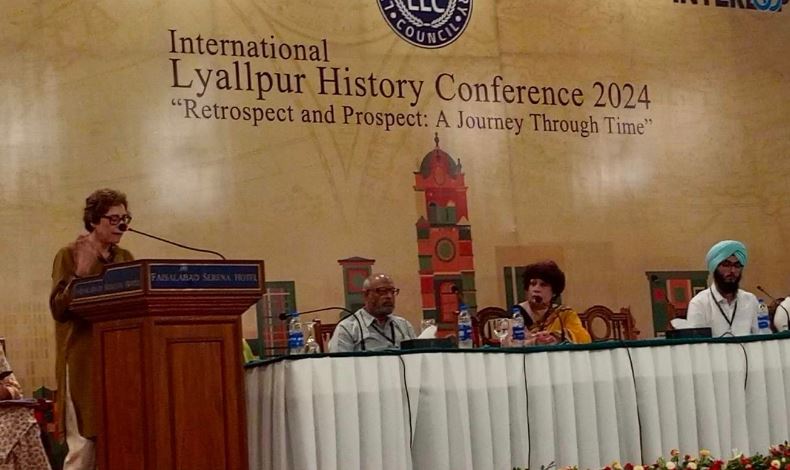FAISALABAD – The International Lyallpur History Conference would play a significant role in highlighting the importance of preserving the city’s history and cultural heritage, said Lyallpur Literary Council President Musaddiq Zulqarnain.
Musaddiq Zulqarnain said that Lyallpur was initially settled as a canal colony, and its good cotton production played a key role in its development into a future textile city and the Manchester of Pakistan. The establishment of foundries, agricultural tools, chemicals, automobiles, and other industries, he said, also changed the city’s culture over time.
He was addressing inaugural session where he spoke on the topic “The Importance of Regional History” at Lyallpur History Conference held in Faisalabad.
Dr. Ali Usman Qasmi from the Lahore University of Management Sciences, Dr. Philipp Ziemsch from the University of Heidelberg, Germany, and Dr. Annie Casting from the Center for South Asian and Himalayan Studies, France, also emphasized the significance of regional history in this session.
Commissioner Silwat Saeed mentioned that this conference would be crucial in advancing work on the history and culture of Lyallpur. Prominent photographer Razaq Venice’ photographs of historical sites in Faisalabad were also displayed.
The first session was chaired by Dr. Kanwal Khalid, Research Consultant at Aga Khan Cultural Services. Dr. Kanwal pointed out that local heroes in the region’s history have been overlooked due to religious biases, and that women were most affected by the partition of Punjab, highlighting the need for further study of their case studies.
Dr. Pippa Wardi from De Montfort University, UK, discussed similarities between the histories and stories of Lyallpur and Ludhiana, saying that both were known for agriculture in the past and now for industrial development.
Dr. Najeeb Haroon from Government College Samanabad, Faisalabad, said that the immigrants arriving after the creation of Pakistan played a significant role in the city’s development.
At the time of Lyallpur’s establishment, it was a mandi town. Dr. Muhammad Yaseen from National Textile University, Faisalabad, commented that social media is exacerbating religious conflicts.
Dr. Chaman Hussain from the University of Punjab, Lahore, mentioned that women played a crucial role in the industrial development of Lyallpur, though they face challenges related to resource access and social mobility.
Man Veer Singh from Minalo School, Atherton, California, stated that during this period, Punjab’s income was higher than many European countries, and it had diplomatic relations with France and Russia.
After the death of Maharaja Ranjit Singh, the Lahore Darbar began to weaken, and Punjab fell into British control in the following decades.
A screening of the French filmmaker and researcher Dr. Pierre Allen’s documentary “A Global Messenger of Qawwali” on the life of Nusrat Fateh Ali Khan was also held.
The third session was chaired by Iqbal Chawla from the University of Punjab, Lahore. He mentioned that during the colonial era, the establishment of new towns under the canal colony empowered farmers, leading them to initiate farmer movements and increase their participation in politics.
Professor Dr. Pashaura Singh from the University of California noted that during British rule, Lyallpur was settled by agricultural experts from across Punjab and that loyalist classes were given land, leading to the 1907 farmers’ revolt known as the Pagri Sambhal Jatta movement.
In response to the impact of this movement on the army, anti-farmer laws were repealed.
He added that the struggle of Indian Punjab farmers for their rights continues today.
Renowned Punjabi researcher Amir Riaz said that approximately four hundred thousand people migrated from Lyallpur in 1947, and the effects of religious extremism and violent nationalism are still present.
Research scholar Muhammad Nasir from Quaid-i-Azam University presented a paper on bonded labor among brick kiln workers. Saima Azhar from the International Islamic University mentioned that before independence, the All India Trade Union and Kisan Sabha worked for the rights of farmers and laborers.
Dr. Abrar Zahoor from the University of Sargodha stated that the 1947 partition based on religious grounds had the most impact on Punjab.
The final session’s topic was “exploring and marking cultural and social dynamics in Faisalabad,” chaired by Dr. Naumana Kiran from the Pakistan Study Center, Punjab University, Lahore.
She highlighted the different periods in Faisalabad’s educational history that require further research.
Dr. Umar Hamid presented a paper related to National Textile University, pointing out that the university started as a college in 1959.
Dr. Zil-Huma from GC University Faisalabad discussed madrasa reforms in Faisalabad and Jhang, saying that Jhang has fewer madrasas compared to Faisalabad.
Among these, 69% of madrasas in Faisalabad and 39% in Jhang are registered with relevant institutions. The International Lyallpur History Conference would continue today.










